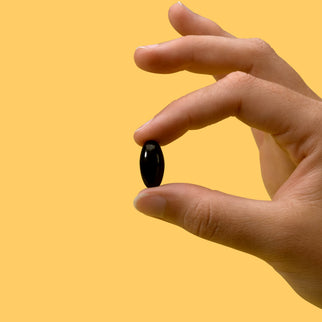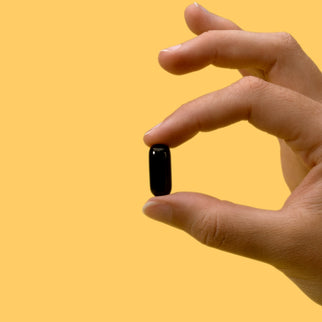Fish oil is one of the most popular supplements out there today, with many people buying it because of its massive reputation for providing health benefits, from supporting a healthy memory to maintaining a healthy heart.
However, for all of fish oil’s potential benefits, there are several reasons you might choose to avoid it. Fortunately, there are many substitutes you can choose from, some of which may provide even better benefits than fish oil.
What Is Fish Oil?

Fish oil is a popular supplement found in many households because of its high omega-3 fatty acid content, and omega-3 fatty acids are important for supporting many bodily functions. As you can probably guess, fish oil is made by extracting fat or oil from the tissues of fish.
Fish oil is extracted particularly from oily types of fish, like mackerel, tuna, anchovies, trout, and salmon. Similar to a source like krill oil, this supplement can either be taken as a gel capsule or by consuming a spoonful of pure oil.
Fish oil is a rich source of omega-3, which is important since the body cannot make omega-3 fatty acids on its own, so we need to get them through our diets. Fish oil is well-known not just because of its omega-3 content but also because of the types of omega-3s it contains. There are three main types of omega-3 fatty acids:
- Alpha-linolenic acid (ALA), which is an omega-3 precursor
- Docosahexaenoic acid (DHA)
- Eicosapentaenoic acid (EPA)
Of these three types, DHA and EPA are the least common in a standard diet. Fish oil contains both DHA and EPA fatty acids, making it an easy choice of supplement for people who do not get these nutrients from other sources.
What Are the Benefits of Taking Fish Oil?
Since fish oil contains both DHA and EPA fatty acids, it offers many potential health benefits. Despite being the least common type of fatty acids in a standard diet, DHA and EPA offer the most benefits. Some of the benefits associated with consuming the omega-3s found in fish oil include:
- Supporting a healthy memory and cognitive function as you age
- Supporting a healthy heart
- Helping to maintain a healthy blood pressure
- Helping to maintain cholesterol levels already within the healthy range
- Supporting healthy joints
Why Would You Substitute for Fish Oil?
Although the high omega-3 content in fish oil leads to it offering many benefits, this supplement is not the best choice for everyone. For example, seafood or shellfish allergies are quite common reasons why a person might not be able to take fish oil.
Other people may avoid fish oil because of the fear of marine contaminants. Over the years, fear of mercury contamination and other chemicals invading our oceans has led to understandable caution for eating fish. Not to mention that eating fish is becoming less sustainable for this reason. Therefore, many people search for ways to get important nutrients without fish.
Some people simply find fish oil unpleasant. The strong fishy scent of the supplement can leave you with bad breath, fishy burps, and indigestion.
Lastly, taking fish oil also does not align with everyone’s lifestyle. For example, people on a plant-based diet are unable to consume fish oil, either for health or ethical reasons. As a result, it is crucial that they find a plant-based alternative that provides the same omega-3 nutrients.
What Are the Healthiest Fish Oil Substitutes?
There are a variety of reasons to search for an alternative to fish oil, but it can be hard to find the right substitute, especially since so many people think of fish oil as the best choice.
However, you may be surprised to find out that there are a variety of options you can incorporate into your daily diet, and some that are even better than fish oil. The following are some of the healthiest substitutes for fish oil.
Flaxseed

Flaxseeds are one of the most well-known sources of omega-3 as they are one of the densest sources of the nutrient. In addition to their high omega-3 content, flaxseeds are also excellent sources of protein, fiber, and minerals like manganese.
Flaxseeds are also easy to include in your daily diet, especially since they can be added to foods you already eat. For example, flaxseeds make a great topping for yogurt and an excellent addition to smoothies. However, flaxseed only contains ALA, meaning you’ll be missing out on crucial EPA and DHA omega-3s.
Chia Seeds
Like flaxseeds, chia seeds are also packed with powerful omega-3s. These nutrient-rich seeds are also high in fiber, protein, calcium, and antioxidants. Chia seeds also have a reputation for supporting a healthy digestive system.
Chia seeds are another great addition to smoothies or oatmeal, or they can be used to make energizing snacks like granola bars and chia pudding. You can even incorporate chia seeds into your recipes to enhance the nutritional value of your baked goods. That said, like flaxseeds, chia seeds only contain ALA — not EPA or DHA.
Walnuts
Another healthy source of omega-3s is walnuts. These uniquely shaped sources of omega-3 are excellent snacks to include in your daily routine. Just a handful can provide you with ALA, the omega-3 precursor, as well as protein and healthy carbohydrates.
Walnuts may also help support gut health, support healthy blood pressure, and promote healthy cholesterol levels. You can snack on walnuts on their own, incorporate them into recipes, or include them in your morning oatmeal — just keep in mind that you’ll still need a source of EPA and DHA.
Vegetable Oils
Vegetable oils like canola oil, olive oil, soybean oil, and of course, flaxseed oil all feature ALA. These sources are rich in ALA along with other fatty acids, like omega-6 and omega-9. Vegetable oils are excellent for cooking and sautéing your favorite foods. To gain even more of the omega-3s packed in, you can use a tablespoon of canola oil or olive oil drizzled over your salad.
Brussels Sprouts
Brussels sprouts are a strong source of the omega-3 precursor ALA. They are also a great source of other nutrients, like vitamin C, protein, and fiber. Steamed with a little bit of salt and pepper or baked in some salt and balsamic vinegar, brussels sprouts make a perfect side for your dinner — just make sure to still incorporate EPA and DHA elsewhere!
Algae

The most impressive item on this list is one you have likely heard the least about. Algae is a lesser-known but increasingly popular source of omega-3, packing the biggest punch of any of the above alternatives. Algae also sets itself apart from the other items on the list as the only plant option that contains true EPA and DHA omega-3s.
In fact, algae is such an excellent source of these omega-3s that even the ocean creatures that feast on it are rich in the nutrient. That’s right — the reason that fish are so rich in omega-3 is that their diet consists of foods rich in omega-3. Eating algae ourselves means that we can get our omega-3s directly from the source, making it the perfect substitute for fish oil.
Which Substitute Is Best?
If you added all of the above substitutes into your diet tomorrow, you would likely be better off for it. However, in a side-by-side comparison, not all of these options provide the same level of nutrition, meaning it is better to choose one alternative over the others.
Fish oil is the chosen supplement for many because it provides both DHA and EPA, the hardest types of omega-3 to find. Most of the options above, however, only contain ALA, which can be converted to DHA and EPA by the body but only in very small amounts. As a result, you need a substitute that has both of these important nutrients.
Fortunately, algae helps fill that gap as the only plant-based source of DHA and EPA. Not only is algae an adequate substitute for fish oil, but it may also be an even better substitute. Algae-based omega-3s are absorbed by the body better than options like krill or fish oil, meaning your body can put them to use easier. So not only do you get the benefits of DHA and EPA from algae, but you also get them more quickly.
Ultimately, if you are looking to choose one replacement for supplementing fish oil, then you should choose algae ten times out of ten. With an option like iwi life’s omega-3 supplement, you can get all of your daily recommended omega-3s and more with just one softgel.
Incorporate Healthier Omega-3s in Your Diet
Although fish oil is a popular supplement, it is not the only way that you can add more omega-3 fatty acids to your diet. To include healthier omega-3s in your daily diet, turn to iwi life.
Made from entirely plant-based algae, iwi life’s omega-3 supplement provides all of the same benefits as fish oil and more. To see all of the potential benefits that come with algae-based omega-3s for yourself, explore our complete family of iwi life products.
Sources:
Alternative Sources of Omega-3 Fats: Can We Find a Sustainable Substitute for Fish? | PMC
Omega-3 Fatty Acids EPA and DHA: Health Benefits Throughout Life | PMC
Omega-3 Fatty Acids: An Essential Contribution | Harvard Health The Nutrition Source





















